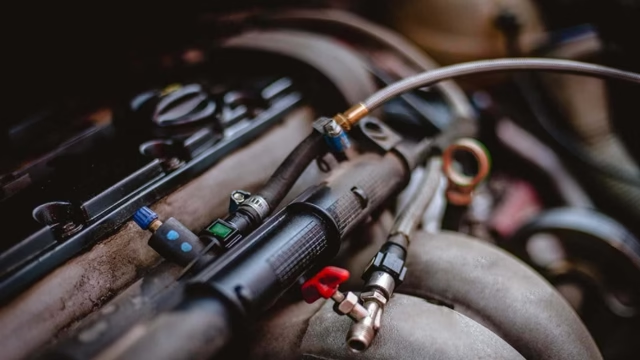Introduction
A car’s fuel system relies on fuel injectors. They affect engine performance and fuel consumption. Their primary function is to accurately deliver fuel to the engine’s combustion chambers. Fuel injection affects engine fuel use and consumption. Learning about fuel injectors and fuel efficiency can help car owners maintain and service these systems to maximise vehicle performance.
The Role of Fuel Injectors in the Engine
Depending on the injection mechanism, fuel injectors spray fuel into the intake manifold or combustion chamber. The carburettor system is replaced by this method, giving you more control over fuel delivery. ECU signals inform contemporary fuel injectors how much, when, and at what pressure to deliver fuel.
This precision ensures fuel-air mixture before burning. Running fuel injectors split fuel into small droplets, which mix better with air and burn more effectively. To produce power effectively with the least amount of fuel, the engine must atomise and distribute fuel. Regular fuel injector service ensures your engine runs efficiently and saves fuel.
Common Fuel Injector Issues That Lower Fuel Economy
A variety of fuel injector issues can reduce fuel mileage. Injector nozzles often clog. Dirt and fuel additives can clog injectors. These deposits can delay fuel flow or disrupt spray patterns, reducing combustion efficiency.
Injector leaks are another issue. When an injector leaks, extra fuel enters the combustion chamber regardless of engine demand. This leak causes the automobile to utilise less fuel. Fuel leaks from damaged or worn injector seals reduce engine efficiency and safety. An injector with a damaged solenoid or improper wiring may open or close at the wrong time. These issues disrupt fuel delivery, worsening air-fuel mixture and fuel economy.
How Proper Maintenance of Fuel Injectors Improves Fuel Efficiency
You must maintain fuel injectors for optimal fuel efficiency. Clean fuel injectors remove deposits and restore spray patterns, ensuring fuel atomises properly. Fuel injector cleaning is an important element of automobile maintenance, and many service shops provide it. By minimising deposits, high-quality fuel and fuel additives can help prevent injector clogging. Fast seal or injector repairs prevent fuel leaks and ensure fuel delivery.
Another important maintenance task is cleaning the fuel filter. Blockages in the fuel filter might impede fuel flow to the injectors, making them work harder and perhaps giving you irregular fuel amounts. Fuel delivery system maintenance improves injector performance and reduces fuel usage.
The Impact of Fuel Injector Technology on Modern Cars’ Economy
Fuel injector technology has improved fuel economy and reduced pollutants over time. Mechanical fuel injection devices were inaccurate at first. Sensors and complicated algorithms in modern electronic fuel injection (EFI) systems adjust fuel delivery in real time based on engine load, temperature, and driving conditions.
The combustion chamber receives fuel via direct fuel injection systems instead of the intake manifold. Their efficiency and power are much higher. These systems improve combustion, fuel usage, and emissions by controlling fuel time and distribution. Multiple-point and variable fuel injection enhance fuel delivery efficiency. These innovations boost fuel economy without sacrificing performance.
Symptoms Indicating Fuel Injector Problems Affecting Fuel Economy
Many signs suggest fuel injectors are harming fuel mileage. An obvious decline in miles per gallon (MPG) indicates that the automobile uses more fuel than usual for the same driving conditions.
Injector failure may cause your engine to idle harshly, misfire, or hesitate when you accelerate up. Uneven fuel delivery causes these issues in the air-fuel mix. Due to leaky or blocked injectors, black exhaust smoke may indicate a high fuel combination.
If you smell fuel around the automobile, the fuel injectors may be leaking. This wastes fuel and risks fire while doing so. Also, fuel system check engine lights or error codes may indicate injector failure.
How Driving Habits and Fuel Injector Condition Interact
Your driving style affects fuel injector fuel mileage. Driving aggressively with fast acceleration and frequent stops requires more accurate fuel distribution. Problems with dirty or damaged injectors reduce fuel efficiency.
Driving smoothly and consistently on the highway reduces fuel delivery system stress and extends injector life. Even if you drive carefully, neglecting your injectors will lower your fuel economy. To maximise fuel mileage, this interaction explains how crucial it is to drive safely and maintain your car.
What’s the Difference Between Fuel Injector & Carburetor?
Conclusion
A car’s fuel efficiency depends on fuel injectors. Their precise operation maximises fuel combustion, maximising power and economy. Fuel injectors that leak, clog, or don’t operate properly disrupt this equilibrium, wasting fuel and reducing power.
Clean, repair, and use high-quality fuel on fuel injectors to extend engine life and improve fuel mileage. Ever-improving fuel injector technology boosts efficiency. Even the best systems need maintenance. Car owners may save money at the pump and assist the environment by maintaining their vehicles. Discovering the relationship between fuel injectors and fuel efficiency can help.







